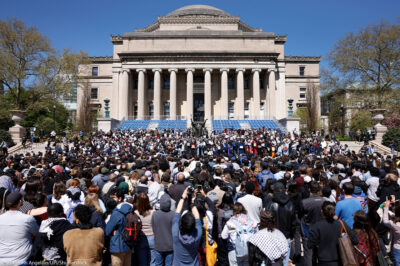Vermont Campaign Finance Measure Would Limit Free Speech, ACLU Tells Supreme Court
FOR IMMEDIATE RELEASE
CONTACT: media@aclu.org
WASHINGTON – The American Civil Liberties Union today urged the Supreme Court to heed more than 30 years of precedent and reject a Vermont measure that would allow the state to impose expenditure limits on political campaigns.
“It is not the government’s role to tell candidates how much they can speak and to tell voters how much information they need to receive during an election campaign,” said Mitchell L. Pearl, an ACLU of Vermont cooperating attorney who is direct counsel in the case along with the national ACLU.
At issue in Randall v. Sorrell, 04-1528, is whether Vermont’s Act 64 violates free speech under the First Amendment, as well the Court’s own precedent against campaign spending limits. The Act imposes severe limits on the amount of money that candidates can spend to promote their own elections, coupled with the lowest statewide contribution limits in the country.
Pearl noted that Vermont is a small state where constituents tend to know their elected officials personally. “Election corruption isn’t a significant problem in Vermont,” he said, adding that Vermont ranked 49th in spending in gubernatorial elections across the country. “Act 64 is causing more harm than good to the candidates and people of Vermont.”
Under Act 64, spending in a gubernatorial race would be limited to $300,000 per candidate and to $2,000 for a State House seat and individuals may only contribute between $200 and $400 to candidates in a two-year election cycle, depending on the office being sought.
In briefs filed with the Court, the ACLU argued that the extreme limits of Act 64 prevent voters from hearing from the candidates themselves, and ultimately magnifies the importance of so-called special interest spending, further undermining the state’s asserted interest in limiting the influence of such groups on the electoral process. In addition, the Act blurs the line between discussions of issues by candidates, particularly incumbents, and election speech.
“The state of Vermont would have us believe Act 64 is only about money and not about speech, when in fact the opposite is true,” said ACLU senior staff attorney Mark Lopez, who is co-counsel in today’s case. “A candidate who has reached the spending limit cannot even drive to the village green to deliver a political speech without violating the law, because mileage counts as an expenditure under this law.”
Thirty years ago, in the landmark case of Buckley v. Valeo, the Justices found that a candidate, “no less than any other person, has a First Amendment right to engage in the discussion of public issues and vigorously and tirelessly advocate his own election and the election of other candidates.”
“Indeed,” the Court noted in Buckley, “it is of particular importance that candidates have the unfettered opportunity to make their views known so that the electorate may intelligently evaluate the candidates’ personal qualities and their positions on vital public issues before choosing among them on Election Day.”
Attorneys for the ACLU are Peter F. Langrock and Pearl of Langrock, Sperry and Wool, LLP in Middlebury, Vermont on behalf of the ACLU of Vermont, and Steven R. Shapiro, Joel Gora and Lopez of the national ACLU.
The ACLU’s briefs in the case are online at www.aclu.org/ scotus/ 2005/ 22826res20051213041528/22826res20051213.html
The Supreme Court decision in Buckley v. Valeo is offsite at http://supct.law.cornell.edu/
Stay Informed
Every month, you'll receive regular roundups of the most important civil rights and civil liberties developments. Remember: a well-informed citizenry is the best defense against tyranny.



